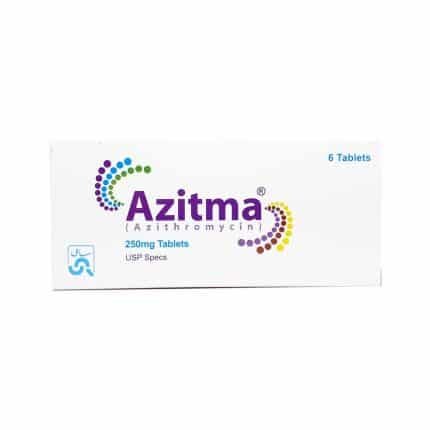Azitma 250mg tablet contains azithromycin, which is an antibiotic used to treat a variety of bacterial infections. It belongs to the macrolide class of antibiotics and works by stopping the growth of bacteria. Azithromycin is commonly prescribed for respiratory tract infections, skin and soft tissue infections, sexually transmitted infections (STIs), and certain other bacterial infections.
Key Features:
- Antibiotic: Azithromycin is effective against a wide range of bacteria and is commonly used for treating bacterial infections.
- Macrolide: It belongs to the macrolide class of antibiotics, which are known for their bacteriostatic and bactericidal properties.
- Convenient Dosage: Available in tablet form for oral administration, making it convenient for patients to take.
Uses:
Azitma 250mg tablet is used for:
- Treating respiratory tract infections such as pneumonia, bronchitis, and sinusitis.
- Managing skin and soft tissue infections like cellulitis and impetigo.
- Treating sexually transmitted infections (STIs) such as chlamydia and gonorrhea.
- Preventing certain infections in people with weakened immune systems.
Dosage and Administration:
- The dosage of Azitma 250mg tablet may vary depending on the type and severity of the infection, as well as the patient’s age and medical condition.
- It is usually taken orally with or without food, as directed by the healthcare provider.
- Follow the dosage instructions provided by your doctor, and complete the full course of treatment even if you start to feel better.
- Do not crush or chew the tablets; swallow them whole with a full glass of water.
Precautions:
- Inform your doctor about any medical conditions you have, especially liver or kidney disease, heart rhythm disorders, or myasthenia gravis.
- Tell your healthcare provider about all medications you are taking, including prescription drugs, over-the-counter medicines, vitamins, and herbal supplements, as they may interact with azithromycin.
- Avoid consuming alcohol while taking azithromycin, as it may increase the risk of certain side effects.
- Monitor for signs of allergic reactions, such as rash, itching, swelling, or difficulty breathing, and seek medical attention if they occur.
Frequently Asked Questions (FAQs):
- How long does it take for Azitma to work? Azithromycin usually starts working within a few days of starting treatment. However, it is essential to complete the full course of treatment as prescribed by your doctor to ensure the infection is fully treated.
- Can Azitma be taken with food? Azithromycin can be taken with or without food. However, taking it with food may help reduce the risk of stomach upset.
- What are the common side effects of Azitma? Common side effects of azithromycin may include diarrhea, nausea, vomiting, abdominal pain, and headache. If you experience any severe or persistent side effects, contact your doctor.
- Is Azitma safe during pregnancy and breastfeeding? Azithromycin may be used during pregnancy and breastfeeding if the potential benefits outweigh the risks. However, it is essential to consult with your doctor before taking any medications during pregnancy or while breastfeeding.
- Can Azitma be used to treat viral infections? No, Azitma is an antibiotic that is only effective against bacterial infections. It will not work for viral infections such as the common cold or flu.






Reviews
There are no reviews yet.